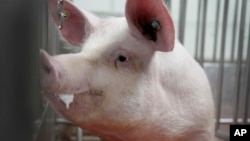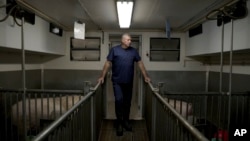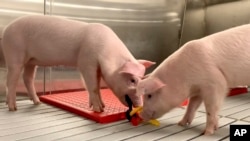Scientists are raising pigs to produce human organs at a specialized research farm in the American state of Virginia.
A medical company called Revivicor runs the farm in the rural community of Blacksburg. The area is surrounded by the Blue Ridge Mountains. Workers at the farm follow intense measures in an effort to prevent infection and disease spread.
About 300 pigs of different ages live on the research farm. Some animals raised there have already provided the first genetically changed pig organs ever transplanted into humans.
Individuals working at the center must undergo a series of safeguards aimed at preventing infections in the organs grown for people.
Matthew VonEsch is an executive with United Therapeutics, the parent company of Revivicor. He told The Associated Press the research farm was designed with the goal of protecting the pigs “against contamination from the environment and from people.”
David Ayares is the founder and chief scientific officer of Revivicor. He described the farmed pigs to the AP as “precious animals” because of their ability to help save human lives.
The research farm looks very different from a traditional animal farm. This is because of the strong security and cleanliness measures needed. It was built to meet U.S. Food and Drug Administration (FDA) safety requirements.
For example, pigs living at the farm only drink water that is highly filtered. All food also gets disinfected.
Revivicor’s farm aims to produce human organs that can be used in scientific experiments or actual transplants.
There is currently a great need in the U.S. for organ transplants. Thousands of people are waiting for a donor organ. But experts say there will never be enough human donors to fill that need.
Using animal-grown organs for human transplants is one possible way to deal with the shortage.
Scientists use genetic engineering methods to grow organs in animals. These organs behave more like human ones than animal ones, which reduces the chances that the body will reject the animal organs. Teams have been working for many years to grow more humanlike organs in pigs.
So far in the United States, four “compassionate use” transplants have happened. These cases involved last-minute experiments to transplant pig organs into humans who faced life-threatening conditions. Two transplants involved hearts and two involved kidneys. Revivicor provided both of the hearts and one of the kidneys.
All four patients died within a few months. Still, experts say each transplant offered the possibility for valuable, real-life research. The goal is to one day attempt to put pig organs into human transplant patients who are not quite as sick.
Revivicor’s Ayares said the company is aiming to produce organs in the pigs that closely meet the size and needs of each patient. The idea is that such organs will perform better than human-donated organs because they are younger and free of disease.
Ayares added that transplant doctors who have received organs from Revivicor’s farm say, “Oh my god, that’s the most beautiful kidney I’ve ever seen.” He said the reaction is the same when they get “a pink healthy happy heart from a young animal.”
Officials at Revivicor say the biggest difficulties they face include overcoming the rejection of pig organs in humans and preventing animals from carrying unknown infection risks. Scientists try to deal with the rejection issue by employing different engineering methods to make the pig organs as humanlike as possible.
Genetic changes are made to the pig eggs that Revivicor receives. The engineered eggs are then nurtured in the lab with the hope of producing a healthy embryo. The embryos are then taken to the research farm to be put inside living pigs.
It is expected to take years of experimentation to prove whether animal organ transplants will work long-term in human patients. But if the efforts succeed, United Therapeutics plans to open additional research farms to produce up to 2,000 organs a year.
Ayares said the efforts are currently at a point where several studies have suggested “there’s no immediate rejection” of the genetically engineered pig organs. He added, “The next two or three years are going to be super exciting.”
I’m Bryan Lynn.
The Associated Press reported this story. Bryan Lynn adapted the report for VOA Learning English.
_____________________________________________
Words in This Story
transplant – v. to perform a medical operation in which an organ or other part that has been removed from the body of one person is put into the body of another person
contaminate – n. to make something dirty or poisonous
precious – adj. very important or valuable
filter – v. to pass a liquid or gas through a piece of equipment in order to remove solid pieces or other substances
compassionate – adj. showing compassion: a feeling of sympathy for others who are suffering
nurture – v. to care for or encourage the growth of something









Forum